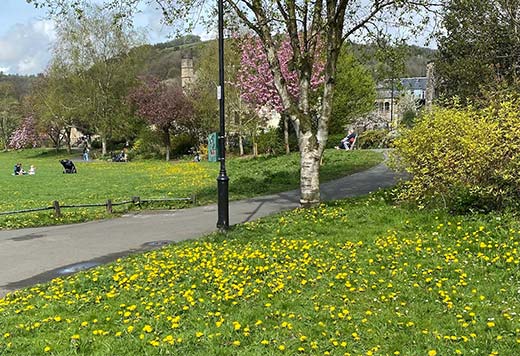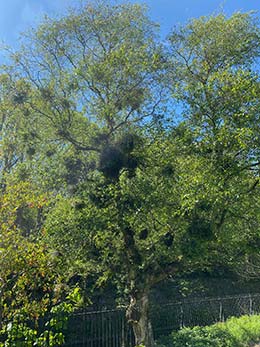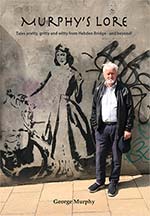
Fifth series, episode 6
All five series are available here on the HebWeb.
In the latest episode, George reports on a mini break to the Lakes, considers the status of dandelions, reflects on VE day celebrations, remembers the good and bad uses of birches, and celebrates being twenty years younger than he used to be, despite doubts from some friends and readers. Finally, he gives timely advice on the birds and the bees.
Effie Grey and Rose la touche
At the start of May we escaped to the Lakes with the promise of fine weather, staying at the Elterwater Arms, in a room with a view across to the little lake. Then we spent a day at Coniston where, unlike Ambleside, there were no crowds and little traffic. We circled the sandy margins of the lake, past bluebells and wild garlic, and turned up steep, gear changing woodland tracks, wondering how coach and horses once completed the journey to Ruskin's home at Brantwood.
These days, a row of tables outside the museum café looks out on the water where Donald Campbell once sped and died but which now affords peaceful views across still water to the hills beyond and overlooks the arrivals and departures of small groups of tourists on the vintage ferry.
On our tour of the museum we were reminded by friendly guides (and card captions in glass cases) of the scandalous story of Effie Grey and John Ruskin. They met when John was 20 and she was 12 and married when she was 18. Their marriage was famously unconsummated. It’s rumoured that John was offended because the glorious locks on his bride’s head weren’t where Effie’s hair ended.
Ruskin had a great influence on William Morris and the Arts and Craft movement, as well as on pre-Raphaelite artists. Effie fell in love with John Everett Millais and when her marriage to Ruskin was annulled on the grounds of non-consummation, she married the pre-Raphaelite painter. They were to have eight children.
I had remembered the Effie saga, but I’d forgotten the sad story of Rose la Touche, an Irish girl and daughter of a rich banker father. She was Ruskin’s drawing student from the age of 9. When he was 39 and she was 18, he proposed to her. Her family did not approve.
His previous marriage having been annulled, as it was asserted that he was impotent, marriage to Rose would have meant that the children of Effie’s second marriage would be regarded as illegitimate. So Rose asked him to wait and for ten years their contacts were mainly arranged through intermediaries. When she died at the age of 28, Ruskin was said to be inconsolable.
Ruskin was a great champion of Turner but it is thought that he burnt some intimate sketches the artist had made of his companion of later years, thinking they might ruin his hero’s reputation if they were made public. Ruskin was also famous for his talks on botany and his lectures to young artists and Oxbridge literati. Being an anti-Darwinist, he once donned wings and pranced about the lecture theatre singing, `Oh, for the wings, for the wings of a dove.’
On dandelions

In the park and on no mow May verges, sunning the way from Yorkshire to the Lakes, we admired the massed crowds of dandelions. When we were kids, dandelions were a folk lore tease, ‘Don’t touch pissabed!’ And so they were left to bask, except in well-kept gardens and council mowed verges, even adorning cracked concrete floors in abandoned industrial buildings. Soon enough they became see through spheres that invited blowing, ‘We love you, we love you not!’ And cleverly enticed we helped their nose sneezy seeds take flight till next year’s display.
But still, thinking it over, seventy years on fine and dandy dandelion, I beg your pardon, but please don’t let your seeds land in my garden!
To which some readers of my musing have responded:
Jean Banaszak in London, Sue James in Suffolk and Pat Munday in Blackshaw Head wrote to say that this year they’ve allowed dandelions to grow in their gardens. Sue pointing out how they help insects such as bees and butterflies and birds.
The poet Steph Bowgett recalled, “My grandma used to turn them into delicious golden wine. She also used them to dye raw wool – reddy brown from the root and soft yellow petals. Linda Maynard pointed out, “George Murphy, goldfinches love them … They eat the seeds. Good excuse for not weeding!”
The VE day celebrations
Some baby booming friends, of liberal persuasions, absentee themselves on such occasions. As if ashamed of people they should praise (including those who on forgotten fields became a gonner) they seem to hold their noses and our heroes they dishonour. I say, don’t let the right salute alone those who fought that fight. Instead recall exactly: after liberating others, they didn’t vote for Churchill but for Atlee.
Crying mums
Actually, diaries from The Wartime Social Survey show that many people were uneasy about the VE Day street parties and wild celebrations. Widows report staying indoors, wanting more quietly to honour the dead. And some still had husbands and sons fighting or enslaved in Burma. But Todmorden artist David Gunning has shared a happier memory of the day the end of the war was announced.
“Our widowed mother put my sister, who was 8, my brother who was 6 and myself, who was 7 to bed in the early evening. A neighbour heard on the radio that the war was over!! She knocked on the doors of all the houses shouting, ‘The war is over!! Our mother got us up and dressed and we went outside. All of the women were singing and dancing. Then a neighbour brought out her old gramophone, put it on the ground and played “Land of Hope and Glory”. As soon as the women heard it they all started crying. Not knowing why our mums were crying, all of us children started to cry. I shall always remember that magical evening!!
Marched across Europe
When we came to Halifax in 1974, we spent one evening at Lewin’s pub on Bull Green. A tramp, name of Harry, visited each table and we would have snubbed him, as others did, if he hadn’t started telling us his war story. Near the end of the war, the Germans marched him across the continent and twice made him dig his own grave, but the Allied advance saved him.
In the 1950s, Harry helped at racing stables. ‘The grooms all used to know me.’ At night he’d slept with Pinto, Lester Piggot’s horse in the Derby and other horses to keep himself warm. His tales were tall and our money was short. We bought him a pint and he moved on. Next day we saw him on Commercial Street, but he didn’t remember us, just asked for some beer money. Thinking about him now, and since then having heard tales from people who marched hundreds of miles to escape the advancing red army, I wonder if Harry’s war time memories weren’t true after all.
Klimt and Kelsey
I like birch trees, both silver and pubescens (downy). In the park and on surrounding hills they swayed elegantly in the cold north easterly gales we endured this March and April. Then the birches’ small leaves unfurled in early spring, twirling and twisting silver then green, allowing sunlight through to dappled undergrowth. When you drive uphill towards Peckett the mass of silver birch remind me of Klimt’s woodland paintings.
Traditional Maypoles were often made from birch, and young girls danced around them to celebrate the fertility of burgeoning youth and nature. Baby cradles were made from supple birch, protecting infants from faery folk who might swap a healthy child for a changeling. Some of the babies who were cast out as changelings are thought to have suffered from autism.
 From a birch in our park hang balls of ‘witches’ broom’, a fungus that looks like shabby birds’ nests. I backed onto the grass to capture the image and stepped onto a wadge of dog muck. Perhaps it was a witch’s prank, but more likely it was dog owners letting their darlings free to scamper about on the playing fields. I thought to myself, ‘Hebden Bridge aka Dog Shitty’.
From a birch in our park hang balls of ‘witches’ broom’, a fungus that looks like shabby birds’ nests. I backed onto the grass to capture the image and stepped onto a wadge of dog muck. Perhaps it was a witch’s prank, but more likely it was dog owners letting their darlings free to scamper about on the playing fields. I thought to myself, ‘Hebden Bridge aka Dog Shitty’.
In folklore, birch trees’ silvery, shifting light was said to be cast by the warrior god Lugh, who could drive out evil. And birch twigs have long been used to drive out demons from ‘lunatics and criminals’. At my sec mod in the 60s, Tom Kelsey, the metalwork teacher, collected birch switches from the woods at the top of the playing fields.
In one lesson, Kelsey crept up behind me when I dared to wander from my worktable, and swished two swooshing swipes of birch across my unjacketed shoulder. That afternoon, painfully undressing for PE, other lads saw my twin stripe wounds and told me I should tell my mum to make a complaint. Instead of which, I sent a letter off to the local paper, arguing that my school was continually breaking the laws on corporal punishment – back then they could flog us but misdemeanours had to be registered in a log book. Miss Critchley, School Governor and Labour councillor, took up my cause, and Kelsey and other floggers (none of whom I’d named in my letter) paused their illegal assaults for a few years at least, until I’d left.
 Hurrah for Haworth
Hurrah for Haworth
Absence makes the heart grow fonder, which I felt when we had an afternoon in Haworth, which has not only the Brontë Museum (best place to park) but a Curiosity shop and other curiosities, and cafes that felt less overrun with tourists than Hebden’s. Also, I bumped into my mate Rod from the Rod and George show. The sun shone and for a while all seemed right with the world.
Is 70 the new 50?
That august body the International Monetary Fund has declared that our own august bodies are younger than we thought. Our 70s are now our 50s! Scientific tests have established that baby boomers are far sharper and fitter than earlier generations. Which I thought was great news, but when I shared my delight on Meta media, some friends were more concerned than I was about the implications for ‘the silver economy’. For, as the IMF argues, if people are living longer, healthier lives, perhaps they should extend their careers to ‘boost growth and make up for the decline in the birth rate.’
Glenda George, formerly of Foster Clough but now living in Scotland wrote: There are lots of manual jobs which take so much out of one that one is forced to retire even earlier. It’s easy to say, “Ah, but we can retrain you,” but this doesn’t really take account of the fact that people who choose hard physical labour are not only unsuited to settle for a boring clerical job indoors but as they find it hard to put their heart and soul into it sitting at a computer are far less likely to be efficient workers anyway. A productive 40 year (often more than that anyway) working life and paying ones taxes should be rewarded; people in receipt of State Pension should not be regarded as idle scroungers. I seriously – seriously - object to pensions being assigned as befits in governmental calculations. They are hard-earned entitlements.
But fellow offcumden Heather Wilson explained: I work because I love my ‘job’. I have a shop/open studio where I open 7 days a week. I could no more retire than fly to the moon. Until I can’t see or use my hands, I am lucky that I can do this for as long as I am able. The pay is non-existent, but I hope I can carry on until I keel over! xx
Guy Lymer agreed with me: In a sense that’s great to hear, but for quality of life, why stay working unless you have to?
Nicola Jones chipped in: Agree with you George – appreciate some want and will but I’m excited to be putting that cognitive stage towards the things I’d rather be doing than being in an office … 100 days and counting.
Jacqueline Davies Hughes in Ellesmere Port wrote: I retired early, good job I did now.
Jenny Nicholson in York, was suspicious, “ … They’ll be having us back at work! Or is my cognitive function a bit on the low side today.
And finally … It seems timely to reflect on …
The birds and the bees
Murphy's Lore, the book, is available to order here
If you would like to send a message about this piece or suggest ideas, email George Murphy
More Murphy's Lore
See the Murphy's Lore home page for over 150 episodes.


